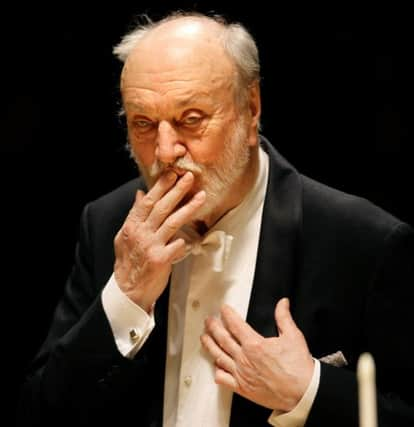Obituary: Kurt Masur, conductor.


Kurt Masur, conductor.
Born 18 July, 1927 in Lower Silesia.
Died 19 December, 2015 in Connecticut. Aged 88.
With his distinguished grey beard and imposing presence Kurt Masur was very much the maestro and was recognised as one of the major conductors of the last 50 years. His years as musical director of the Leipzig Gewandhaus Orchestra (LGO) brought him international renown and his interpretations of Beethoven, Mendelssohn and Schubert are preserved on disc. Throughout his early years at Leipzig Masur was a communist – though never a member of the party – but in the 1980s he supported anti-communist rallies.
Masur was principal conductor of the London Philharmonic Orchestra (LPO) from 2000-07 and is also credited with transforming the fortunes of the New York Philharmonic Orchestra. His period as musical director (1991-2002) with the latter was a golden era and helped to recapture the glory days seen under the imperious Leonard Bernstein in the 1960s.
Advertisement
Hide AdAdvertisement
Hide AdMasur was applauded worldwide in 1989 when Mikhail Gorbachev visited East Berlin to celebrate the 40th anniversary of the German Democratic Republic. A vast crowd gathered outside the Gewandhaus and the authorities ordered them to disperse immediately. Masur calmly admitted them into the auditorium and made a speech calling for measured restraint on both sides. He then initiated a political debate – then unknown in East Germany.
Within four months the communist regime was toppled and free elections were held. Masur was acclaimed as a national hero and, it is thought, offered the presidency of the reunified Germany. With a broad smile he quipped: “Am I so bad a conductor that I have to become a politician?”
Masur has an indirect connection with Scotland. In 1997 he founded the Mendelssohn Festival on Mull and in 2011 the Royal Scottish National Orchestra played at the Empire Theatre, Eden Court in Inverness a concert which was repeated the following week in Leipzig. Franz-Michael Erben, an associate of Masur’s in Leipzig, conducted both concerts.
In 1946, Masur attended the Leipzig Conservatoire and studied the piano, organ, cello, composition and conducting. At 14 he had been diagnosed with inoperable tendon damage which resulted in his never conducting with a baton. On graduating, he worked with various German orchestras and from 1960-64 Masur conducted Berlin’s Komische Oper which was then directed by the avant-garde Walter Felsenstein.
In 1970 Masur was appointed chief conductor of the LGO, a post he held for 16 years. Their famous hall had been damaged during the war and he persuaded the government to rebuild the Gewandhaus – and then raised the standard of the orchestra with his quietly authoritative conducting.
In 1972, Masur had an accident on the autobahn: his wife was killed and he was paralysed for several months. But with typical tenacity he returned to his career and was in charge for a further ten years at the LGO. But in 1996 he became disillusioned with the country after reunification: in fact, since 1991 Masur had been a regular guest with the New York Philharmonic and had gained the orchestra’s respect for his commanding musicianship and endeared himself to audiences. Masur, however, expected a certain audience decorum and once walked off the platform during a performance of Shostakovich’s Fifth Symphony because of the coughing. He soon returned. Again Masur was caught in the cross fire of orchestral politics and was asked to retire.
Apart from those few years in Berlin Masur did not conduct in the opera house – nor did he record any operas. Unusually for such an eminent German conductor he was never engaged to conduct at Bayreuth. He was an acute observer of music and an outstanding interpreter of the German repertory. He was a man of much musical and social integrity and coaxed music from an orchestra with a dignified smile.
He led the LPO on a tour of Scotland in 1999 and The Scotsman was enthusiastic in its praise for the maestro in a review: “Masur is a motivator par excellence and in a riveting account of Bruckner’s 7th Symphony you could sense all the musicians (and the audience) perched on the edge of their seats.” Meanwhile, asked by Scotland on Sunday how he encouraged orchestras to play, he simply replied: “I do not fear orchestras.”
Advertisement
Hide AdAdvertisement
Hide AdCurrent Royal Scottish National Orchestra assistant conductor, Jean-Claude Picard, was selected by Masur as the winner of the 2013 Mendelssohn Scholarship and studied under the maestro in Leipzig.
Masur was married three times. His first marriage was dissolved in 1966. His second wife died in the car crash and in 1976 he married Tomoko Sakurai. She and his children survive him.
ALASDAIR STEVEN